#trying to do within the context it was created in and like this goes for all movies not just gay movies and i think taking that approach
Text
i always feel so alienated when i see ppl talk abt the overrepresentation of tragedies within queer media and stuff bc while i do understand where ppl are coming from, i just enjoy consuming sad media in general lol so i cant truly relate to the frustration of not getting to see happy things.
and this isnt even me being critical of that argument bc i 100000% understand where it comes from, i 1000000% think its valid, studies have shown that queer people need positive representation to not feel so hopeless for their futures and stuff so like. i get it. i just like sad shit man! and i dont think we should stop having popular sad gay narratives altogether just bc of oversaturation.
i think its a hard convo to have bc we realize how rare the opportunity for mainstream gay media comes about and so i get that people don't want the "uber mainstream gay media" that happens twice a decade to be a tragic sad fest like they all are but i think maybe the answer is. we either need to change hollywood which is basically impossible OR we just like, stop looking to big hollywood studios for representation and start giving our money to independent studios who are making a lot of stories w queer ppl at the helm and stuff. because if we have a lot of different shows and films that involve queer people, then it wont matter if some of them are tragedies, and maybe then we can finally stop throwing groundbreaking queer media of our past under the bus and/or advocating for the death of queer tragedies when there are very much queers out there who love tragedies <- like me.
#the brokeback brainworms led me down some rabbitholes and im like grrrrrrr#me on the outside: youre allowed not to like the media i love bc we all have different tastes#me on the inside: *killing u with my mind*#i also just think the crit can be a little insensitive to the people who do see themselves represented by queer tragedies#like you guys do not know the depth of how much brokeback mountain affected ppl. like you probably have an idea but it runs fucking DEEP#and also i think that seeing young generations shit on queer tragedies of the past is kind of like a man yells at brick wall sit bc#the media already exists and you cant change it and they came out at times that were very different in terms of social acceptance of gays#so like idk. also in general im just a big advocate for trying to meet a piece of media halfway and judge its success based on what it was#trying to do within the context it was created in and like this goes for all movies not just gay movies and i think taking that approach#can make ppl better critics#but also i mean youre allowed to just not wanna get involved w sad media. esp sad gay media. i know a lot of ppl who are rly sensitive to#sad shit and thats totally fine. theres just ppl out there who are sensitive to sad shit in the opposite way in that we love it and it#consumes us and drives us to make changes in our lives for the better and so i would hate to see sad gays go away#in the end the true villain was the hayes code all along#like if they didnt make it a mandatory thing that gay people needed to fucking die in order to be represented at all we wouldnt#be having these conversations and youd let me fuck off to my mountain to get my back broken in a really sad way
5 notes
·
View notes
Text
I made some funny comics a little while ago about the potential effects of Fukuzawa's ability on Chuuya's, and how it perhaps could make it revert to a pre-Arahabaki state.
I realized later that some of you lack the context for where that came from, and that I might be creating confusion, so this is a (hopefully) comprehensive walkthrough of things we learned in Storm Bringer that lead to this conclusion.
tldr; The lab created "Arahabaki" by manipulating an ability into a destructive force. That ability existed before the lab, and the nature of that ability is heavily implied to be the power to enhance other abilities through touch.
Explanation and sources below (so you can judge yourself) ⬇
- spoiler warning for Storm Bringer, hopefully written in a way that you'd understand even if you haven't read it yet -
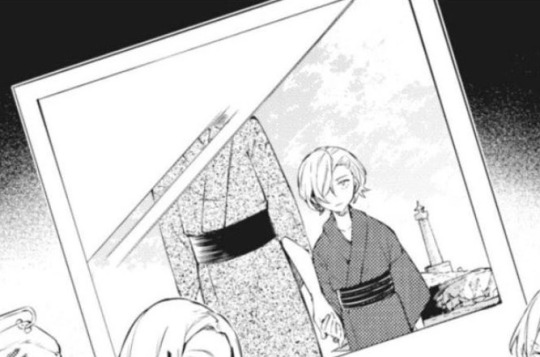
In Storm Bringer, Chuuya meets the scientist that was responsible for Project Arahabaki, Professor N.
Project Arahabaki, N explains, was the Japanese government's secret project to create an ability singularity they could have control over and freely use as a weapon.
What are singularities? Singularities are what happens when abilities clash in specific ways and create a new, unforeseen reaction. The easiest way to create a singularity is to pit two contradictory abilities against each other to create a paradox; examples included the ability to always deceive and the ability to always perceive the truth, and to have two ability users who can see into the future (*coughs* Oda and Gide) try to one-up each other. The result is usually much more powerful than the original abilities on their own.
Some singularities are said to have been explained as god-like interventions, because of their often destructive nature. This is what inspired the name "Arahabaki", after the mythical being (here's a post of the subject and I'll it link at the end too) These events are described as very rare.

Like mentioned in that passage, there is another way to create a singularity: to have a single ability user use their ability in a way that contradicts itself. This is what the lab was trying to do.
For that explanation, Professor N gives an example. He first shows a video of a child, whose face is hidden from the camera, holding a coin (described as having a certain melancoly to it), with a moon and a fox engraved on it. The video is from one of the lab's tests. The child is made to recite some activation lines, which are directly taken from one of Nakahara Chuuya's poems, Upon the Tainted Sorrow (which does mentions a fox, as a fun fact).

The coin then starts glowing, the glow turns into a black mass, and from there the experimentation goes bad: the coin starts attracting things and absorbing them, the space gets distorted, the child's vitals flatline, panic spreads and someone calls for an emergency stop, we hear a scream. The video ends.
N explains that the child in the video had the ability to enhance the ability of others. That child then used that ability on themselves, effectively enhancing the enhancement which enhanced the enhancing, in an infinite loop. That loop created a lot of energy; the surplus of energy was so intense its mass deformed space (physics!) and it created a black hole.
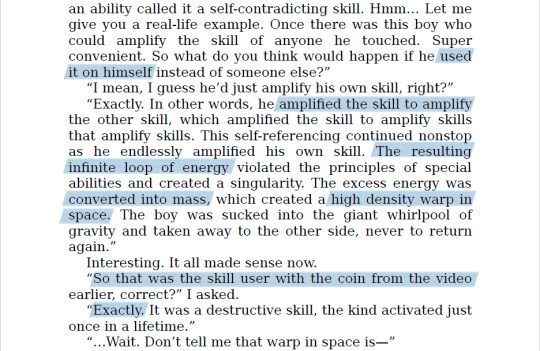
Here's where it gets tricky: N claims that child died during that accident, that the child was absorbed by the black hole created by their ability. We never actually learn their identity.
But N is a lying liar who lies; he said about one and a half truths the entire book. The only reason he was telling them any of this was that he thought he'd get rid of all of them within the next few minutes. His objective was always to regain control over Chuuya, his pet project.
Plus, during the epilogue, we learn that Chuuya was assumed to have died during the war. That's what his parents think. That's what is officially recorded.
Furthermore.
Project Arahabaki was based off French research papers; someone else had done this kind of experimentation before, and their result was Verlaine.

-

Verlaine's gravity-manipulation is a singularity. Better yet: Verlaine also has a Corruption state, named Brutalization. Their abilities are the same, because the lab copied the techniques that were used to create Verlaine when they worked on Chuuya.
Here's a passage of Dazai nullifying Corruption, at the very end of SB:

"The self-contradicting skill, which was supporting the energy of a singularity". This passage confirms that the source of Chuuya's ability is, in fact, like the child's and Verlaine's, if any doubts remained. "[...] weakening the singularity's output. It wasn't long before it returned to its normal state, and the Gate closed." The Gate refers to releasing Arahabaki, it's basically a limiter, just like the passage above when talking about Brutalization. When Dazai nullifies Corruption, he gives that limiter the opportunity to come back and seal Chuuya's power away again, but does not stop the singularity, only allows it to go back to its stable state.
From all that, we can say that Chuuya's ability wasn't always gravity manipulation, but that it was another, unconfirmed ability that was exploited in such a way that it became a permanent, stable singularity that allowed him to have control over gravity.
-
Bullet point recap:
Chuuya's gravity manipulation comes from a singularity, like Verlaine, like that child;
You need a self-referencing/self-contradicting ability to create that singularity;
Such an event is rare;
There is a substantial amount of time spent describing a "random" child that was experimented on during the war;
That child created a black hole through their singularity;
That singularity was activated using a passage from Nakahara Chuuya's poems, while holding a coin that references it;
That child supposedly died;
Chuuya's parents think he died during the war;
N is a pathological liar with an agenda.
So no, there is no "confirmation" that Chuuya's ability was ability enhancement before the lab took him. But an author writes a story with an intent, so I am asking what Asagiri's intent was when writing all this, and if perhaps we weren't indirectly given the answer already.
-
What is Arahabaki (Fifteen and Storm Bringer lore, with too many citations)
My own perceived timeline of the true events behind Storm Bringer (was originally gonna be part of this part, also with too many citations)
#the dazai parallels are a nice little bonus because we KNOW chuuya as a character was designed to match dazai#he was most literally designed to go with him and contrast him#but that's meta analysis so i didn't include it in the actual post with the rest of the textual evidence#bsd#bungou stray dogs#bungo stray dogs#bsd analysis#bsd theory#bsd meta#bsd chuuya#bsd nakahara chuuya#bsd storm bringer#bsd stormbringer#stormbringer#storm bringer#i'll reblog this to my art blog tomorrow so the people most concerned have more of a chance of seeing it#apparently i talk sometimes
1K notes
·
View notes
Text

Alrighty, here we are again
previously, in harrowcita the ninth:
this happened
currently, after ch. 2 (once again, I wanted to read more but realized these notes were too long):
first off, I need to point out something very important
reading the first part of gideon, this was how the dynamic of her and harrow felt like, from gideon's pv in the first chapter or two
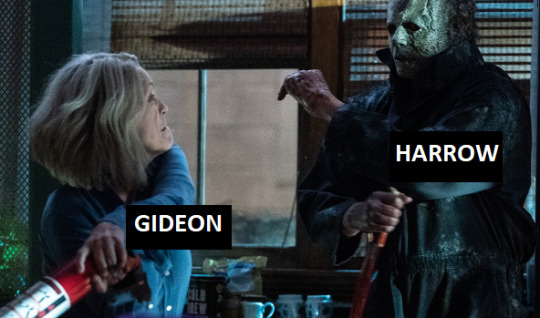
this is what it actually was like, now that I have harrow's pv
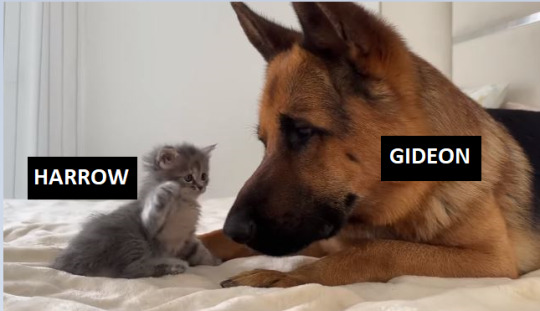
so, now that we've cleared that up, let me tell you about the emperor
I don't know about this guy
something's not adding up for me
I feel like he's either lying, telling half-truths that benefit him or he doesn't know what he's doing
and none of those options are very god-tier
he's also constantly going like "harrow, I'm gonna let you choose" and five minutes later he's "oh, actually, you never had a choice to begin with, I'm so sorry about that"
I don't think you're sorry if you've done it like 3 times since we've met you
maybe say what you actually mean, unless you're full of lies
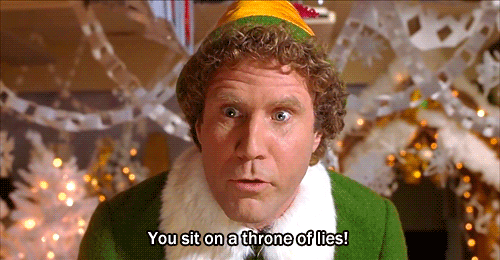
he takes harrow on a walk through the clown death star ship he's got going on
and takes her to his coffin hangar
shows her coffins of the people he made to send to the ninth
the new ninth people
aiglamene is gonna have to work overtime
(I can't believe I've never forgotten her name)
and then there's coffins for all the little friends we made in canaan house
:) ♥
except there are a bunch missing people
let me just note the info we got
the second says "no human remains inside"
last we saw them, martita was KO and judith was bleeding to death
nobody from the third as well, and we already have suspicions about wtf is happening with these parsley and cilantro twins
from the sixth, one is empty because CAMILLA ISN'T DEAD GODDAMMIT
the other one has little pieces of palmolive in it
me picking up the pieces of palmolive from the decor of canaan house
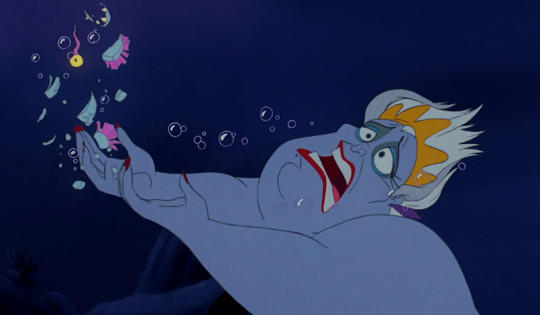
there is one coffin for not!dulcinea
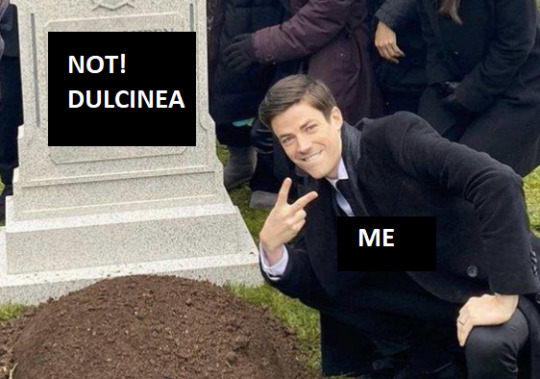
the emperor guy says he's taking her with the other lyctors
as long as he flushes afterwards, it's fine
we are, by the way, trying very hard to not mention gideon ever, apparently
just wanna point out real quick that THERE'S A LOT OF PEOPLE UNACCOUNTED FOR and this guy is GOD so he's doing a terrible job
or he's not saying all he knows
or both
all this time, ice cube barbie is tagging along
ice cube barbie is harrow's babadook, which I stan tbh
since she's here to stay, let me show you another pic of that doll because it's my favorite from the haunted beauty collection
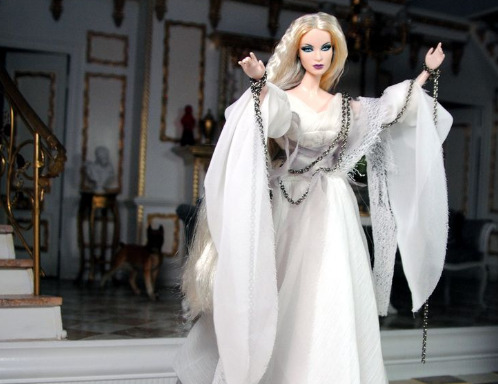
so, the emperor starts telling harrow what they're fighting against (or escaping from) and where they came from
this man explains what he wants and leaves out what he wants
at one point, when harrow asks something like "how will you explain all the dead people?" he goes like
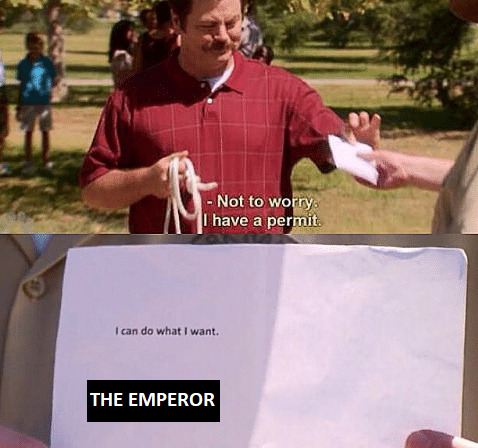
he asks harrow about death and the process of it and she says, at one point:
"In cases of apopneumatic shock, where death is sudden and violent, the energy burst can be sufficient to countermand osmotic pressure and leave the soul temporarily isolated. Whence we gain the ghost, and the revenant."
this is important for the later conversation about revenant beasts, which are the things that the emperor is having trouble with
but I highlighted it because I am adding it to my notes of "reasons why gideon could be not dead forever"
I am holding on to all the hope I can get
because if sudden violent death can leave the soul temporarily isolated and not do the due process of transitioning to the river or whatnot
and gideon isn't within harrow or whatever
maybe
maybe she's somewhere else
I don't know, let me have this, don't tell me anything, just
LET ME HAVE THIS
so yeah, basically the story is that the emperor is running away from nine revenant beasts, which were created during the resurrection, when a planet was blasted off
nine beasts like nine houses
there's three left now
I don't know about all of this, you guys
I don't have enough context and I don't trust this guy here
how do I know where we stand in all this?
what if he's not the good guy and what he did was some planetary bullshit to begin with?
what if the other side is the good guys?
what if he's killed by one of our heroes? like harrow or gideon or camilla?
because he's actually a false god jerk?
what if I kill him????
and then we have two last important things
first, barbie ice cube speaks now
love that for her
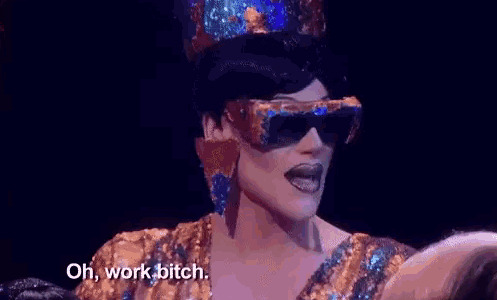
then, very crucial
the non-gideon mentioning seems to be a Thing
I don't know if I'm understanding correctly but
the emperor mentions ortus
ortus, the one we knew, our old pal from the ninth
and I got the feeling, idk if I got it, that he just assumed ortus was the cavalier she had with her
because 1) he didn't go down there and 2) no body was recovered
and then harrow also mentions ortus, but she says he "died thinking it was the only gift he was capable of giving" and that she "wasted it" and idk if she did that because she's blocking sad memories, she's confused because she's Not Doing Great Mentally Right Now, she doesn't wanna tell the emperor what actually happened, or all three
there's stuff about ortus I don't know, but that sounds to me more like what gideon said than what ortus "Got Blown To Bits With Mom In Ship" did
and then the emperor says his name again with suspicion and I'm like
I think this clown doesn't know
I think he doesn't know about gideon
I think he doesn't know about gideon or who gideon actually is
which we don't know yet either but it's probably important
because she's hercules, as previously established
I think maybe gideon is an outlier
an important planetary outlier
I have hopes
also, another day without camilla
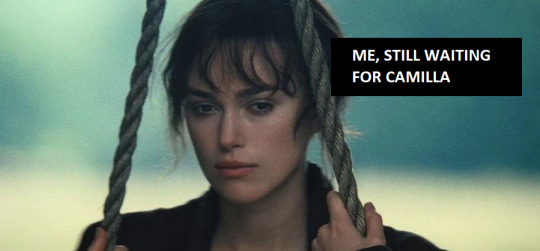
god (not this one) I hope I can make shorter recaps but there's so much happening, I'm so sorry
#luly reacts to tlt#harrow the ninth#harrow the ninth spoilers#tlt spoilers#long post#the locked tomb
108 notes
·
View notes
Note
What are your thoughts on the je'daii? Do they even work, like I find myself irritated by the concept because people often use them to validate/prove the notion that "balance = both sides of the Force"
If you stick to what George Lucas said, in Star Wars a person being "balanced" is someone who accepts their inner darkness and resists its pull nonetheless.
When fans mention the Je'daii, it's usually in the context of:
"The Jedi downgraded from the Je'daii, limited their studies of the Force, refusing to study the Dark Side was a mistake. It was an original sin that caused them to create an imbalance within them."
Which is weird, to me, because the whole point of the comic's narrative is that:
the Je’daii Order’s way was doomed to fail.

Introduced in the Legends comic series Dawn of the Jedi (2012), the Je'daii are the predecessors of the Jedi. They are an order of Force users who studied and practiced both the Light Side and the Dark Side in hopes of finding Balance.
The reasoning is simple: everyone has a bit of good and bad in them, you learn to master the good and the bad sides inside of you, indulging them equally. But while this method seems sound on paper… it didn't work.
Consider that they’re already dabbling with the Dark Side...
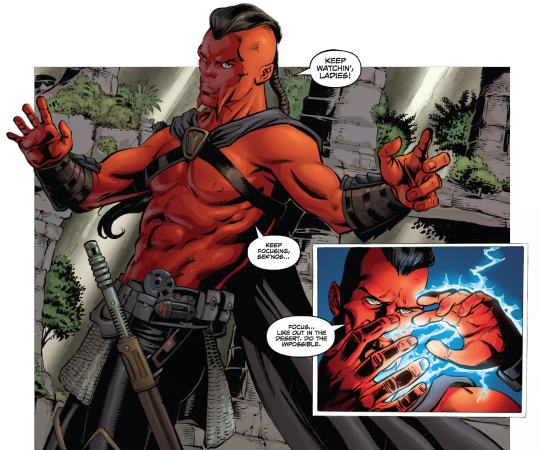
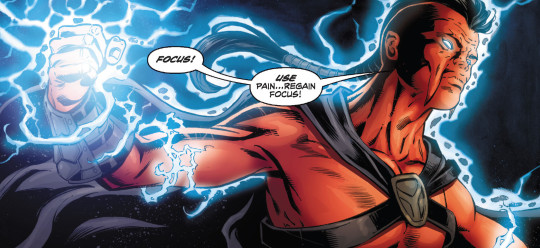
... but hey, at least they’re aware of its dangers, they’re trying to be responsible about it.
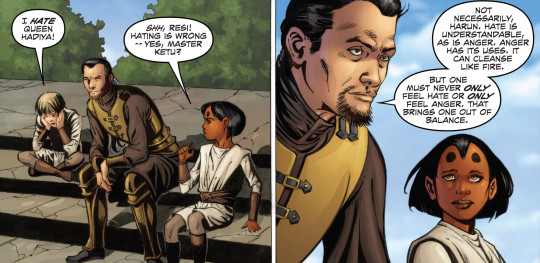
There's a support system where they all warn each other when they're about to cross a line. But even then, there's many who've fallen and been exiled to a moon, to be rehabilitated.
Suddenly, circumstances compel all of them to use the Forcesaber, a weapon that only activates when you draw on the Dark Side.

And that does something to them. Over the course of a year, they all become increasingly aggressive.
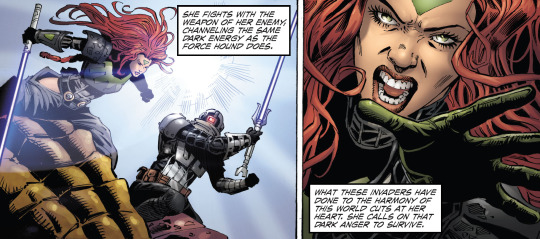
Soon, a faction breaks off because they no longer want to stop using the Forcesaber. They’re addicted to the Dark Side.
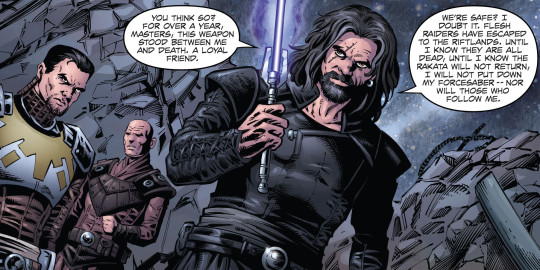
A war ensues, at the end of which the Jedi Order is born, a group of Force users who:
acknowledge and accept their inner darkness,
while also striving to overcome it rather than give it power.

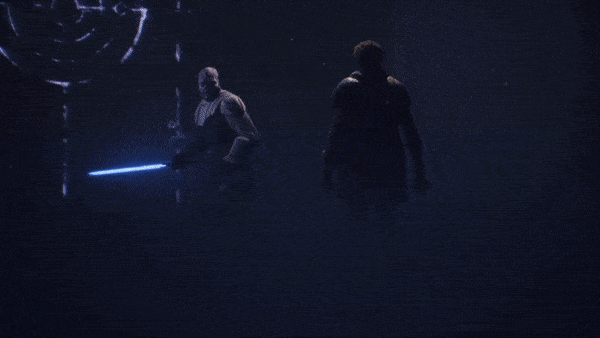

So that’s the moral of the whole Je’daii story.
Their idea of "Balance by wielding both" was actually so fragile and difficult to maintain that all it took was a little push for them to become vulnerable to the Dark Side's temptation.
Hell, even after the Jedi Order was established, one of its founders, Master Rajivari - who in Dawn of the Jedi (2012) is framed as a wise ex-general who, albeit strict, spends his days meditating and philosophizing - he goes to the Dark Side too!
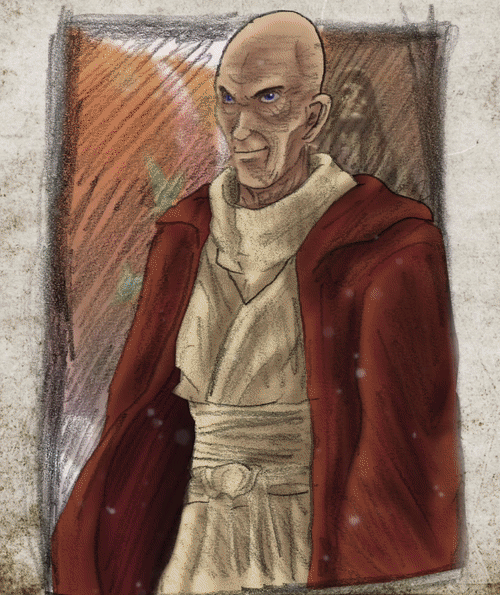
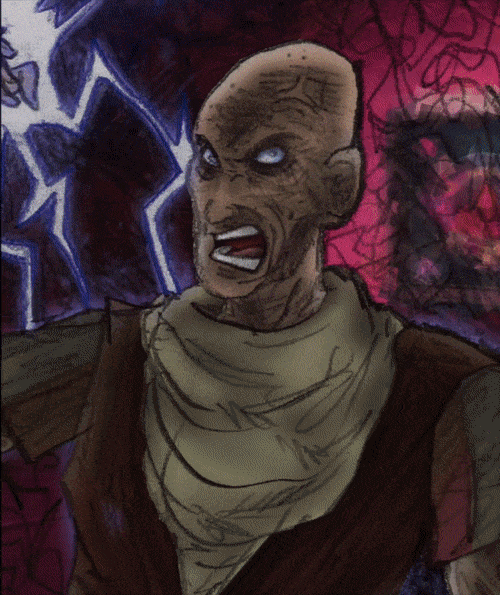
Because that's how the Dark Side works.
The Dark Side isn’t just "negative feelings" or a "bad guy superpower" that you can mix with a "good guy superpower" to unleash the ultimate 'Force blast'. This isn’t an anime.
The Dark Side is a drugs/smoking/drinking addiction.
It's selfish, temporary pleasure. The more you consume it...
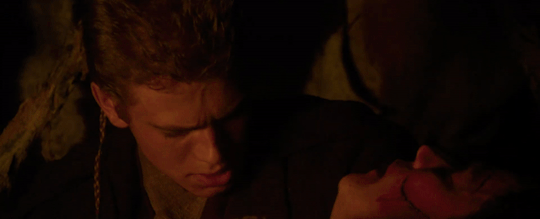
... the more you get addicted...

... and the more it consumes you right back...

... until nothing remains.

Jon Ostrander, who wrote Dawn of the Jedi (2012), echoed this sentiment multiple times:
“As I see it, those working on the light side work with the Force, channeling it, open and sensitive to what it tells them. They serve it. Those on the dark side try to impose their will on the Force, to make it do their will, to make it serve them. The Je’daii believe in a balance between the light and the dark side and so attempt to use both. Problem is, a balance is hard to maintain and the dark side is so very seductive.”
- John Ostrander, LA Times, 2012
“The Je'daii aren't light side or dark side, although they know and are aware of both. Instead they seek a balance in the Force between light and dark. Balance, however, is a difficult thing to maintain and there is always the danger of falling wholly to the dark side — and some Je'daii have done so.”
- John Ostrander, Newsarama, 2012
And this is a recurring theme throughout all of Ostrander’s comics, by the way. Be it with the Je’daii, but also with Quinlan Vos or Cade Skywalker, the point remains the same:
"Yes, wielding the Dark Side gives you great power, and you get to show off some badass new tricks...
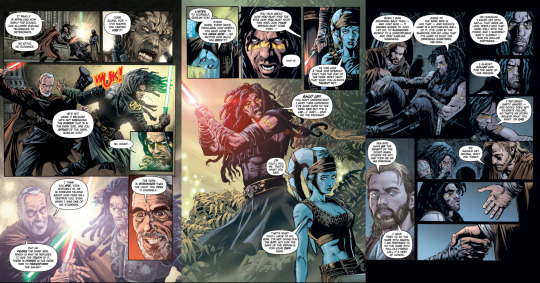
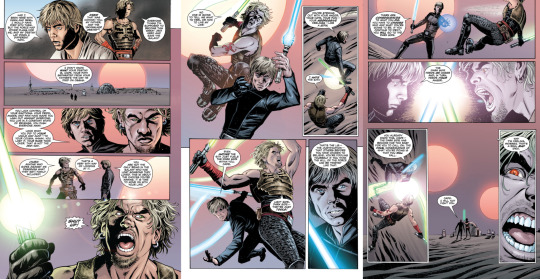
… but it ultimately destroys you and everyone around you."
Remember: if it weren’t for Cade or Quin’s loved ones, neither of them would have come back from the Dark Side. They aren't badasses because they can use Force Lightning, they're badasses because they found the strength to give that up.
So if you genuinely think the Jedi "downgraded" by refusing to give the Dark Side more power than it already has on them... you're missing the point.
“It’s not about ripping things out of the sky using the Force or Force Lightning. A lot of people, they think “oh look how powerful Vader is, look how powerful the Emperor is, I want to play be the bad guy because I get these powers”. It’s an empty feeling, at the end of the day, after the moment. [...] The Dark Side is a spiral downward that you’re trapped in.”
- Dave Filoni, “Force of Rebellion”, 2018
It was an upgrade.
Framing "balance" as "equal Dark and Light Side" is like consuming one (1) salad a day and one (1) whole bottle of vodka and calling that "balanced". No, buddy, that'll kill you. Because:
The vodka is better at being destructive than the salad is at making you healthy.
It's won't stay just one bottle per day. It'll eventually become two, three, etc.
Because as George Lucas stated time and again, resisting the Dark Side is a constant struggle.

So that's my two cents.
You've probably already heard about the recent announcement of a Dawn of the Jedi feature film, a biblical epic that will be directed by James Mangold.

And truth be told... it scares me SO much that we came THIS close to an Episode IX: Duel of the Fates that framed "balance" as - you guessed it - giving equal power to your light and darkness.
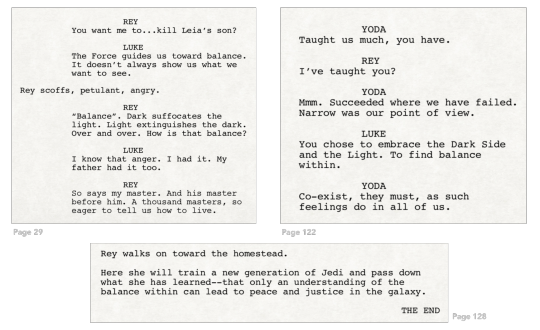
Like, how did this ⬆️ get as far as it did? Did nobody think to sit Colin Trevorrow down and explain to him that he fundamentally misunderstands how the Force works?
So all I can do is cross my fingers and hope James Mangold has a better grasp of - if not the lore (I wouldn't be surprised if the words "Je'daii" or "Tython" aren't uttered once in the film) - at least the message.
#incidentally Jon Ostrander is one of the few EU writers who actually *got* the Prequels' intended narrative#je'daii#je'daii order#star wars legends#expanded universe#jedi#jedi order#in defense of the jedi#jedi culture#Dawn of the Jedi#the force#dark side of the force#jon ostrander#jan duursema#dave filoni#meta#QnA
480 notes
·
View notes
Note
Do you think Rollo, Fellow and Gidel could be in the main story? And if that's possible, could the events where they appear be canon? Or maybe they have an entire chapter giving them more development?






As much as I would love for the Halloweenies (yes, that's what I'm going to call Rollo, Fellow, Gidel, and any other subsequent new character introduced for TWST's Halloween season event) to show up in the main story and get further development, I don't think it's feasible within the current "canon" timeline. There's a good reason why Yana said that vignettes and story events don't always fit within the main story: it's because most of them would make zero sense if they happened within the single school year where all the OB stuff pans out. This is, of course, also true of Glorious Masquerade and Stage in Playful Land.
The main issue is that important details would automatically become continuity errors. Both GloMasq and Playful Land occur around Halloween, with Playful Land happening during the holiday prep and the conflict of GloMasq taking place on Halloween Night itself. But... this can't be the case for the main story because that creates faults in logic. Yuu does not learn who Malleus is until book 5, which occurs all the way in mid to late winter--yet if GloMasq were canon in the main story, then Yuu would have already have knowledge of his true identity (since Malleus's peers are all addressing him by name). Furthermore, Yuu should only know the first few dorms' members by mid/late autumn in the main story, yet they act like they're already acquainted with all of the students in the Halloween events. Why, then, would Yuu/the boys act confused or as if they don't know these people/Yuu when meeting them later in the main story?
This goes even deeper than just making issues surrounding Yuu. GloMasq and Playful Land becoming "main story canon" disrupts the storylines in place for other characters in the main story. Deuce's UM, for example, is integral to Rollo's defeat. However, Deuce does not actually develop said UM until book 5, which, again, takes place in the mid to late winter time. It's not possible for Deuce to have his UM in autumn, when GloMasq happens. Additionally, Ortho is shown in his College Gear for the Playful Land event, which he does not canonically get until the end of book 6. Book 6 takes place shortly after book 5, meaning probably late winter or early spring, which is way after Halloween.
We cannot say that GloMasq and Playful Land occur in the year after Yuu's first. While this could explain away Yuu's wonky relationships with everyone, Deuce's UM, and Ortho being a full student, this doesn't explain why the third years are still present or why everyone is in the same grade level they'd still be in for the year that Yuu joins NRC. The first years would be second years, second years would be third years, and third years wouldn't even be around anymore; they'd be away on their internships, most of which are not on Sage's Island.
Another potential problem is that the Halloweenies showing up in their own dedicated main story chapters spoils the people who didn't play their respective events. (This is assuming that TWST would give a recap of the events Rollo, Fellow, and Gidel came from; it robs the original event stories of their impact because the truth is that a summary can never do the full event justice. However, there is no avoiding this because otherwise not everyone would have context for the Halloweenies.) It's either that, or the players get no context whatsoever for who these characters are or what their relevance is, which interferes with trying to tell a story about their development and getting the out-of-the-loop players to care about their growth. It's not like you can go back and read the original events whenever you want either, you had to have played through the events in full when they were originally running (or rerunning) in order to see the stories in your albums.
Anyway 💀 as you can see, there would be a multitude of issues in trying to squeeze Rollo, Fellow, and Gidel into the main story. Not saying that it's completely out of the question, but it seems very unlikely to me unless TWST does a rug pull and introduces canonical diverging timelines within the game's main story narrative or something. Right now, I definitely do not see the Halloweenies being incorporated in that way. At best, maybe we'd get more official content of them if they ever got more card releases or something.
#twst#Malleus Draconia#twisted wonderland#Rollo Flamme#Fellow Honest#Gidel#disney twst#spoilers#question#notes from the writing raven#disney twisted wonderland#Ortho Shroud#Deuce Spade#Yuu
127 notes
·
View notes
Text
Making Characters That Make Sense
Walk-through character template & "how to" guide for writing complex, original protagonists.
If you google "character templates for writing", you'll get a lot of very basic examples that read like a grocery list: eye colour, hair colour, skin colour, positive traits, negative traits, etc.
And sure, filling out this kind of template isn't completely useless - but it's also not particularly useful, either. Choosing whether your protagonist has blue eyes or green eyes isn't going to determine whether readers connect with them or not.
Instead, I prefer to use the below template:
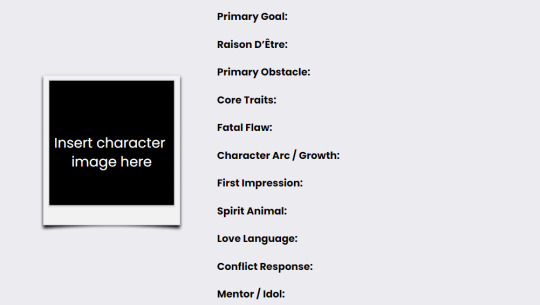
There's some fairly left-of-centre categories here, so in this blog post I'll be creating a character from scratch to demonstrate what each section means and how to use the template effectively.
Primary Goal & Raison D'Être
Fantasy Romance is having a bit of a tournament-to-the-death moment right now, with Hunger Games-inspired stories like Fourth Wing, Throne of Glass, The Savior's Champion, and The Serpent and the Wings of Night in high demand - so that's what we're going to work with in today's blog post.
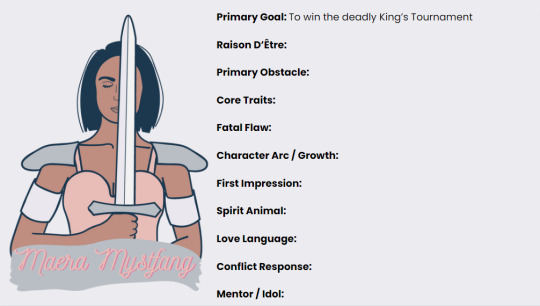
The story premise and primary goal of the protagonist are almost always interconnected. In this case, the story premise is a tournament to the death - and the character's main goal is to win that tournament, obviously.
But where there's room for some originality is in the raison d'être. This loosely translates to "reason for being" or "purpose". It's the why of it.
For example: what motivated this character to risk their life by entering such a tournament in the first place?
It is sometimes helpful to look at similar stories when thinking about this category. Not so you can copy their protagonist's motivations - but so you can do something different.
The whole selfless-self-sacrifice thing, for example - that's done. At least in relation to this particular sub-genre. We can do better for our hypothetical Maera Mystfang character.
Actually, let's really turn the trope on its head and make her raison d'être incredibly self-centred.

Already, this is character is shaping up to be something a little bit different within the niche of tournaments to the death. Which goes to show how putting a little bit of thought can go a long way, even with something as simple as identifying your character's initial purpose.
Primary Obstacle
Every protagonist needs a goal - and every goal needs an obstacle. This is what gives the story some tension and keeps readers turning the page.
An obvious choice of obstacle for this hypothetical character, since we're dealing with a fantasy romance, would be that Maera starts to develop feelings for one of her fellow competitors.
This concept has definitely been done, but that's okay. Not every section of this list has to break the mould. Tropes exist for a reason and it is totally okay to lean into them sometimes.
However, just for funsies, I'm going to try and put a slightly different spin on this one too.
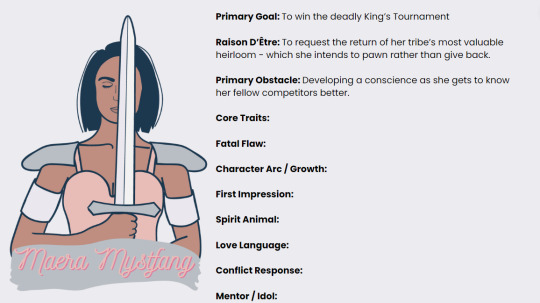
Instead of the obvious "I love one of the people I'm meant to kill", let's make Maera's (previously dormant) conscience be the problem. Her reasons for entering the tournament may have been self-motivated, but as she gets to know her fellow competitors - admires some of them, even - she starts to second guess those reasons.
Core Traits
A lot of character templates will divide personality traits into positives and negatives - but I don't think this is particularly helpful. It is far too one dimensional - not to mention unrealistic. The key components of someone's personality aren't usually so black and white.
In fact, most core traits are both good and bad at the same time - it just depends on the context.
Instead of being wholly positive or negative, try to think of three core character traits that can serve as two sides of the same coin, with both positive and negative implications to each.

For Maera, I've given her these core traits:
Self-reliant;
Rebellious; and
Good-humoured.
Her self-reliance means that she is incredibly capable - but it's also the cause of her selfishness. She's always had to look after herself, so she expects others to do the same.
Her rebellious attitude means she isn't willing to accept the status quo. But at times she is also a rebel without a cause, causing trouble just for the fun of it.
Her good sense of humour means she is fun to be around, but she also tends to not take things as seriously as she should.
Thinking of core traits in this multi-faceted way not only adds realistic complexity, but it also sets you up well for showcasing character development and growth throughout the story.
Fatal Flaw & Character Arc / Growth
You've probably read negative reviews that throw around terms like "Mary Sue" or "Gary Stu". People tend to be over-zealous with these terms, especially for Mary Sue, but the gist of it is that the character in question is "too perfect".
They're the chosen one, they're good at everything, all the boys like them, etc.
Some characters can get away with this just fine. Look at Aragorn. He's the ultimate Gary Stu but I still swoon every time he opens those damn doors. You know the scene I'm talking about.
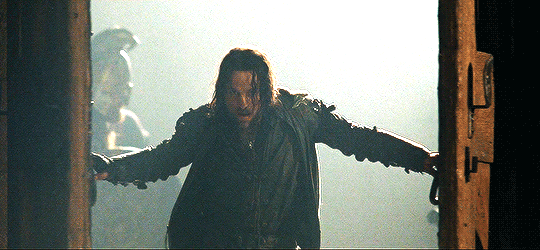
Ooft.
But for the most part, you want to incorporate a fatal flaw into your protagonists - because this is what gives them room to grow.
And, no. "I was born to be King but I don't wanna" does not count as a fatal flaw.
Instead, think bigger. Think worse. Think about where your character starts versus where you want them to end up. Think about how you want the events of the narrative to change their world view - or even their initial goal.
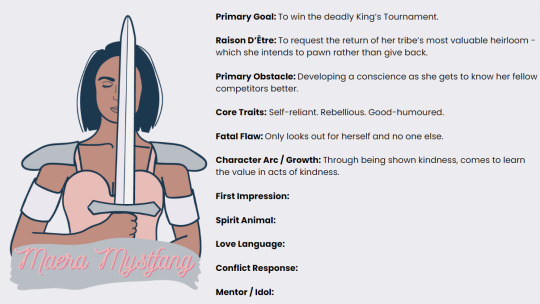
For Maera, her fatal flaw is pretty obvious, given her initial motivations for entering the tournament. Similarly, her growth/arc is linked to her primary obstacle, which is developing a conscious.
Her journey throughout this hypothetical story might be learning to appreciate how her past shaped her, while also acknowledging that there are things she can do to ensure others don't have to go through what she did. By being shown acts of kindness, she learns to appreciate their value.
First Impression
Now that we've covered all the "big picture" stuff, let's get into some of the smaller details that give your character some texture.
The first impression category is a hypothetical exercise where you image how your character might appear to a room full of strangers. In dual, multi, or omniscient POVs, you might even get the opportunity to include this impression somewhere in the story.
But even for first-person narratives, it is still worth thinking about, because it will help to inform how other characters interact and respond to your protagonist (at least at first).
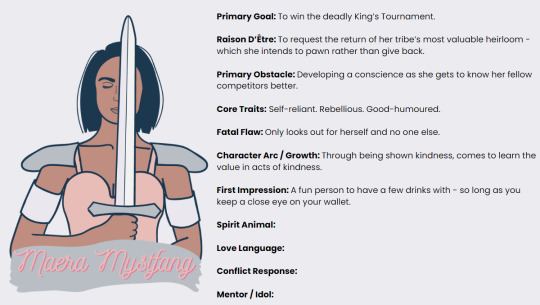
For Maera, I've written this first impression as: a fun person to have a few drinks with - so long as you keep a close eye on your wallet.
From this description, we can guess that Maera probably likes to have a good time, but also comes across as untrustworthy. Whether that impression is deserved or not is up to you, as the author, to decide.
There's also a lot of deeper directions you can take this first impression category, too. Like if most people react to Maera this way, but one particular character doesn't, then your readers are going to sit up and pay extra attention during that interaction. Especially when that person reacting atypically is the future love interest.
Spirit Animal
Ah, this one is a fun one!
I always encourage my authors to assign a "spirit animal" to their characters - especially when they're doing multi-POV.
There are two main reasons for this:
It will allow you to assign some very distinct adjectives and verbs with that particular character; and
It is an opportunity to flesh out some additional character traits beyond the core traits.
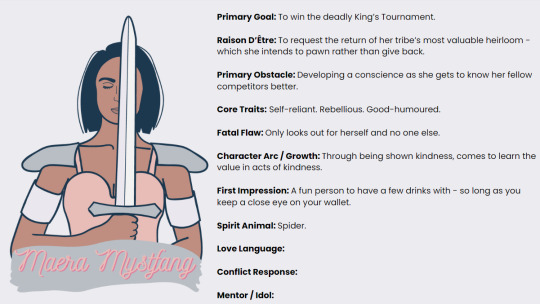
For Maera, I've chosen "spider" because she is solitary by nature, opportunistic, and patient.
But, more than that, I also like the idea of Maera being the kind of person who knows how to watch and wait. While her first impression might be "here for the good times", her joking façade is actually a mask she wears while carefully observing others.
For example:
Her words were laced with venom.
She crawled her way across the rooftop.
At some point, weaving lies had become more of a past time that a necessity.
Her thoughts were a tangled mess.
She didn't bother to conceal her predatory gaze.
Inch by cautious inch, she crept forward.
Her sanity was already hanging by a thread.
If there was one thing she knew how to do, it was spin a good story - truth be damned.
I've never outright compared Maera to a spider in these examples, nor have I made it blatantly obvious that that's what I'm doing. But by peppering these kinds or words throughout the story, I'll be able to subtly create a very distinct kind of impression for her character.
For comparison's sake, let's assign "cat" to the love interest. Examples of possible words to consider in this instance might be:
He clawed his way through the bushes.
"What are you doing?" he hissed.
The comment had some bite to it, that was for sure.
He slunk away into the darkness.
His still, unwavering focus was unnerving.
He prowled towards her.
In a few quick, agile steps, he'd made it across the parapet.
He yawned and stretched out beside her.
Of course, not every single word you use in association with a character needs to be related to their spirit animal. But keeping a certain type of animal in mind - and finding opportunities to throw in some subtle messaging through language choice - can be beneficial on so many levels.
It helps to distinguish your characters from one another through the kind of language you use to describe them - but it's also just really, really fun way to add some bonus texture to your characters. Giving your readers some little easter eggs like this is never a bad thing.
Love Language
If you're unfamiliar with the concept of the five basic love languages, then here's a quick visual overview:
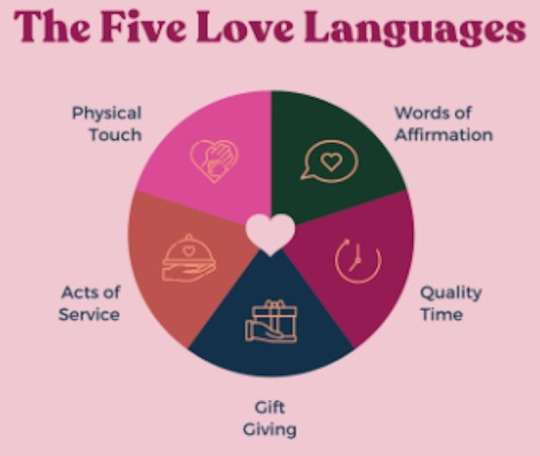
Love languages aren't a consideration that's specific to romance. They're important for friendships and familial relationships too.
Because thinking about what your protagonist values most in love is going to tell you a lot about who they are. Especially when you take the question deeper and think about why this is something they value.

For Maera, I've chosen "Acts of Service" because this ties in quite well to her character arc.
In terms of Maera's why, I could easily go with "because this was how she was shown love as a child" - and this is a good enough option most of the time. However, since her love language is very much tied into growing out of her fatal flaw, then I actually want to do the opposite.
Maera winds up valuing acts of service because this is something she craved - and wasn't given - as a child. She had to do things the hard way instead. Hence why she ends up appreciating the kindness of others so much. Such generosity is new to her - and precious.
Conflict Response
This is potentially one of the most overlooked character components. Conflict and tension is central to story telling, yet there is so little attention given to creating authentic, original responses to conflict.
The way I see it, there are three main considerations in regards to conflict response:
How your character reacts in the moment;
The unhealthy methods they use to deal with the aftermath; and
The healthy methods they use (or discover) to self-sooth.
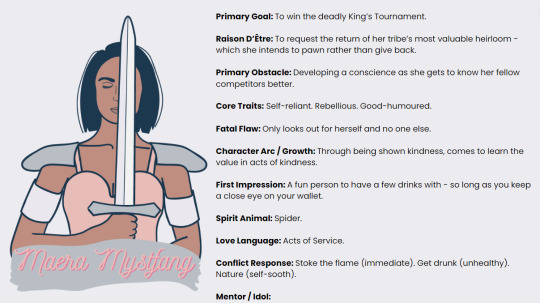
When faced with conflict, Maera's immediate reaction is to antagonise. She doesn't like to back down and enjoys creating trouble.
However, in the aftermath, the conflict affects her more than she lets on. She stews on it - and her solution to that is to get drunk until she can forget about it completely.
But even though she sometimes forgets it, Maera has a more healthy coping mechanism at her disposal. When she is surrounded by nature - in the forest, by the sea, whatever - it calms her.
In addition to identifying your protagonist's various responses to conflict, it is also helpful to think about why. Again, this is a great opportunity to insert something unique into their character backstory.
With Maera, for example, let's think about why she finds nature so soothing. Perhaps, amidst a very bleak childhood, one of her fondest memories is of picking grapes in a vineyard.
Perhaps the elderly woman who owned the vineyard was very rude and abrupt - but also quite kind to Maera in her own way. Maybe she would sometimes stitch up Maera's clothes or feed Maera a hearty, meaty dinner - even though she didn't have to.
If you're struggling to think of a real, tangible, unique memory such as this - then it's always helpful to go back to the old classic of write what you know. Think of a real life moment or memory - something that's stuck with you, no matter how simple - then adapt it to your character.
To create this vineyard example, I simply drew on my experience of picking strawberries with my Nonna after school.
Mentor / Idol
I could write an entire thesis on mentors. Or, more specifically, the "death of the mentor" trope - both in its literal and metaphorical interpretations.
But, for the sake of brevity, let's save that sh*t for another time and focus on what's important for a basic (yet complex) character template. And that is:
The Formative Mentor (past); and
Transformative Mentor (present).
The formative mentor (or idol) is someone who influenced your character prior to the events of the novel. Sometimes they're a character the reader will meet, or other times, they're long gone before the novel even begins.
The transformative mentor is a much looser term. It doesn't necessarily have to be a traditional mentor character, but rather it is a character who heavily influences or changes your protagonist throughout the events of the novel.

For Maera, I want her earliest idol to be a random female sell-sword who she crossed paths with. Prior to meeting this sell-sword, Maera was living without hope for a future, surviving on scraps and petty crime.
But after seeing an independent and moderately wealthy sell-sword in her local tavern, Maera got a glimpse into the kind of life that might be possible if she learned to fight. With the right kind of skills, she might be able to earn some decent money for a change - and travel the world.
This is an example of how "mentors" don't always have to be a wise wizard who oversees your protagonist's training and education. Young minds are impressionable - and even distant figures can have a lasting impact.
Just look at all the women who cite Legally Blonde as the reason why they were drawn to law. Elle Woods wasn't even real - but for plenty of young girls, she made an impact.
Similarly, your protagonist's "present" mentor or idol doesn't necessarily have to be a wise wizard either. It can simply be someone who motivates them to change their world view or strive to be better.
In romance, it is more than acceptable to have the present mentor coincide with the love interest - especially in standalone enemies-to-lovers. I know this seems counter-intuitive, since the word "mentor" implies a power imbalance, but it makes more sense if you readjust your definition of mentor to be "inspires change".
However, for Maera, I kind of like the idea of pairing her up with a love interest who shares some of her flaws. I vibe with the idea of making him a bit self-interested too, although for different reasons.
So in her example, I've listed the present mentor as a selfless secondary character. The way I would envision this going is Maera and the love interest team up early on - but somewhere along the way a secondary character saves them both. They're both heavily influenced by this character before this character sacrifices themselves. The aftermath of this incident rattles both Maera and her love interest, and serves as the spark for growth.
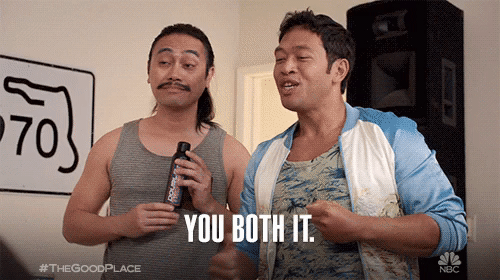
I hope you found this template - and very long explanation - useful!
#writing tips#character tips#book blog#writing#creative writing#character concept#originalcharacter#writeblr#writers on tumblr#writerscommunity#writer community#writer problems#writer things#original character#fantasy character#romance writing#writing advice#writer tips#writer tools#the smut analyst#raison d'etre#character traits#character tropes
164 notes
·
View notes
Note
Since you have mentioned your own original webcomic has time travel, do you have any advice for people who want to make comics or simply write stories that deal with time travel?
Could be any kind of time travel, like time loops, characters traveling to the past/future, dealing with paradoxes, etc.
Short answer: don't LOL
Long answer: Obviously if you wanna tackle time travel, go for it, but the first and most important rule of any time travel is to establish your rules. How does the time travel work? And how will you commit to consistency?
Some basic time travel rule structures include:
Clone travelling - This is the most common form of time travel that's used the most. When you go back in time, your past self is present alongside your present self. Examples include Harry Potter and the Prisoner of Azkaban, Doctor Who, and Austin Powers.
Singular consciousness travelling - This is one I've only seen used a couple of times, and the only one I can think of off the top of my head is Life is Strange, but what I like to call 'singular consciousness travelling' is the form of time travel where instead of travelling to a point in the past, you return to a version of your past self, fully aware of the future that awaits you but 'stuck' within that past to live out the timeline in real time again. Though it's not as commonly used, it's one that will typically present less paradoxes as there are less moving parts to worry about. Prophecy storylines also use a similar philosophy to this, albeit without the literal time travel and more so 'time travel' via premonition (could we call Raven from That's So Raven a time traveller?)
Loops - This is a form of time travelling seen in media such as Groundhog Day, where a person continuously travels back to the same point in time over and over again to relive the same events until they can somehow break the loop.
There are loads more of time travel structures I could go over, but those are three of the most basic. Regardless of which structure you use, you have to be willing to commit to it. It's like choosing a writing perspective and tense, if you choose third person past tense ("he said, she said, they said"), then suddenly switching to first person present tense ("I say", "I do", "I feel") without any context to establish that switch will be jarring. Make your rules, and if you have to break them, make sure they're broken for the sake of the story (ex. if you present some sort of plot twist to reveal the 'true nature' of the time travelling plotline).
Here's a great video that goes over some different time travel plotlines from movies/books/etc.:
youtube
As for my original comic, we go for the time travel = multiverse theory approach, where any changes made to a timeline in a past state will not change that timeline's future, but rather, create a new timeline where those past changes are true and written into the script, essentially relegating every single new timeline to a parallel universe. This is essentially how it's done in Avengers: Endgame , but instead of characters abusing the laws of quantum physics to travel back in time, it's characters abusing a magical book of diary entries that are primarily used by the main character to help him control and guide his time travelling abilities. Every diary entry essentially serves as a roadmap for him to find his way back to his home timeline from which he disappears every time he jumps. Much of the story is written entirely atop a paradox, specifically the bootstrap paradox:
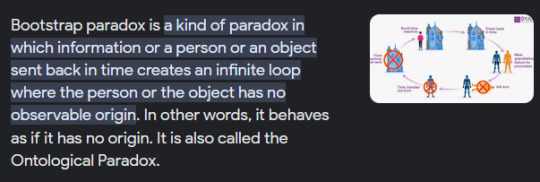
(because if there are gonna be paradoxes no matter what you do, may as well have fun with them!)
There's a lot more I could go into regarding that, but for the sake of sparing the handful of Time Gate readers here of spoilers, Time Gate's laws of time travel dictate that you can't really change your past, just the future for other versions of you that you create when you try to change things.
All that said, I will say that in most cases, thinking too hard about any time travel story will cause it to fall apart, because time travel is a fictional trope that relies a lot on logical sequencing of events to work. So you kind of do just have to 'let it go' and have fun with it - but having rules to stick to will make things less of a headache for everyone, especially when it comes to telling a coherent story. Even my own criticisms of LO's time travel really don't matter in the end, because LO's problems go far deeper than some cheaply-made time travel and any of the time travel problems in the story will undoubtedly be explained away as "timey wimey shit". I'll still be pissed about it, but time travel isn't real (at least not for you) so it's not worth getting too bogged down by. Just do your best to tell an entertaining and coherent story.
85 notes
·
View notes
Text
I have no idea what this is but I decided to write down my grand theory of Star Wars and how authorship affects the ways in which stories are good and bad? Come for media critique, stay for the analogy at the very end about how Star Wars is like college, also there's gifs
The original trilogy is a series of derivative works. That's not a pejorative, but a description of their content and structure; they are constructions that use existing pieces to tell a new story. They are samurai movies, they are meditations on Joseph Campbell. They are the work of a film nerd trying to create a story that is Everything. There's nothing novel about the storytelling of the original trilogy; it was just particularly well executed, because they were made with love by a craftsman, surrounded by a team who kept him from giving in to the worst of his narrative excesses (most notably but not limited to Marcia Lucas).
There's a lot of No Reason in the original trilogy. Why's Darth Vader so strong in the Force? No reason. It doesn't have time to delicately explain everything, so it relies on the audience's understanding of the shape of the story to fill in the gaps. It's the time in the story for someone to fall in love, so a romance plotline it shall be. The author is trying to do something, and he successfully does it.

The prequel trilogy represents an older creator for whom derivative works were not enough, who had been creatively stifled by the very thing he created. (I strongly recommend Patrick H Willems's series about Frances Ford Coppola if you want a really interesting take on George Lucas and the tragedy of his career.) Extremely importantly, they represent a creator with almost unlimited cash and no one to tell him to tone it down.
Everything that is bad about the prequel trilogy is because they were made with a vision by a creator who was trying to do something. George Lucas has six hours and fifty-eight minutes of material prepared about diplomacy, representative democracy, and how all unchecked power is always all bad and by god we are all gonna sit here until he finishes it. The writing is so clunky because it is not there to build character or relationships; it is there to convey information. The sequences with the Gungans are such a mess because they're the injection of (very inadvisable) comic relief into a story that is not supposed to have any relief at all.
One of the worst sins of the prequel trilogy is the rejection of No Reason. It continually poses questions that do not need answers and then takes pains to answer them. Why's Darth Vader so strong in the Force? His mother conceived him as a virgin birth because of the Force, by way of midichlorians, which as we all know are the powerhouse of the cell. It is such a deeply unsatisfying answer, but George Lucas seems incredibly sincere about the fact that this is important. He is trying to position his derivative work within a new fandom context that conceives of his work as wholly original, and the wild thing is, I think George Lucas always thought all of this and just wasn't allowed to put it in. Improbably, the problem is not that he hasn't thought enough about his own lore, as a common charge goes; he appears to have thought about it way too much.
I have to confess to not being a prequel trilogy fan, but probably the single biggest thing to come out of it is Obi-Wan. Ewan McGregor almost instantly became the canonical version of the character. It's because the same thing that made it bad also made it good. It's a story that is trying to do something, and that is opening wide an almost Stendhal-syndrome-esque array of locations and people and stories. Fuck yes I want to hear everything about the person Alec Guinness used to be when he was young and badass, tell me everything about the weird desert guy. Of course I wanna go to Space Italy and see what the galaxy was like before it got dicked up. Sinister rise to power of Darth Vader's master? Check. Seeing the evil enemy built as a series of actions is the shit prequels are made for.
When the prequel trilogy is boring, it's because the pacing is fucking awful, especially in Revenge of the Sith. The dizzying array of new stuff is never boring, and you can all fight me on Kamino being one of the best planets in the whole series. When it's good to be in George Lucas's mind palace, it's extremely good. For better or worse, he did it. He gave his almost seven hour lecture, he said what he had to say, and he left.

And then we move forwards in time, into an era of Star Wars as a strategy rather than a story.
(I didn't see Solo, so it's not gonna be in here. Neither are any of the TV shows or the EU, because I have other shit to do with my life.)
The Force Awakens was not the first Star Wars film that was made by someone else; the authorship of The Empire Strikes Back is complicated- George Lucas kind of managed to ghostwrite his own movie?- but he definitely didn't direct it. Empire was very much still a Lucas production in which he was intimately involved.
The Force Awakens has a point, but it ultimately doesn't do anything.
It resets everything back to the start: an evil empire represented by British people in suits come to power; three heroes arise; a mentor who's incredibly important apparently despite only knowing the heroes for five minutes is murdered by a cloaked Force user; something is blown up. It is meant to stoke the fires of nostalgia, and it provides nothing substantive in terms of plot. In fact, it represents a retrograde movement. It is a very fun watch and a movie with absolutely nothing to say, at least nothing that wasn't written into the series thirty years beforehand.
It's not a surprise that, since it's just meant to get people hype and then serve them what they already know, the best thing it provided were its new characters. I was so stoked to see a Black person in a Star Wars movie; we got three new main characters and not a white man among them?? But let's fuckin' table that shit, because we all know what's coming.

[I was gonna put in a Kylo Ren gif but he looked like such a dipshit in all of them, you're welcome]
Actually I lied, I forgot that what came next was Rogue One. The purpose of the film is to make a war movie about Star Wars and like many/most war films, what the movie is trying to do is meditate on the duality created by the futility of war and the value of sacrifice, it fills in a blank in canon but is really a tone piece meant to make you have feelings and reflect, I watched it once and it was so touching and horrible that I've never been able to watch it again, 10/10 no notes
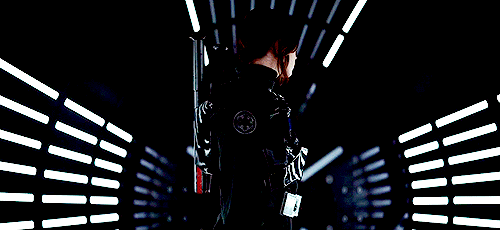
And then we have The Last Jedi, which is weird.
The Last Jedi represents a step back to a craftsman at the helm, and the exact same shit happened again.
It shouldn't have, because it happened again in a completely different way! The Last Jedi is a singular vision with one creative direction, and that is the cause of everything that is bad and everything that is good about it, but Rian Johnson wanted to do something radically different than George Lucas. He's not interested in giving you his Star Wars lecture; he's interested in breaking Star Wars open, thrusting it bodily in a new direction. The Last Jedi represents at least as much movement as The Empire Strikes Back.
So it's not like a shock that the movie was wildly divisive, and lists of the best and worst things are the same items shuffled around. I honestly think Admiral Holdo's death is the finest moment in the entire trilogy, in terms of visuals and in terms of emotional impact. I fuckin' love that Luke was sitting on PTSD Island sulking, because it's some Luke shit to do. "Let the past die. Kill it if you have to" got me HYPE to see where this would go. I wanted to go on that ride. I've loved Star Wars since I was a tiny child, and I wanted to go on a journey into something that was entirely fresh.
Other people hated all of these things, and honestly in this case, I don't agree but I can't say they're wrong. Wanting Rose to be deleted from the series simply for using oxygen is racist. Wanting Snoke to have had more impact on the story is a difference of opinion. Either you were interested in this ride or you weren't, and you're not a bad person for not wanting that out of your Star Wars.
But on the other hand, it's not a very good movie.
The problems that make it not very good are the result of having one guy at the wheel. It's clumsily made. It feels like it ends three times before it actually does. The Canto Bight sequences are the work of someone who doesn't want them to be in there, and somebody who could play ball would have finessed the story to make them organic. Some of the CGI work represents a lapse in professional judgment. The Force dyad stuff does not make any sense at all, because it plays like somebody who couldn't really explain a thing they were doing but refuses to stop doing it.
It's so good when it's good. I just wish it had had another screenwriter who could have fixed what was bad.

I didn't care for Rise of Skywalker.
By the time it came out, I was experiencing a kind of numbness surrounding Star Wars; not literally, because I got my tattoos finished up just before it came out. I didn't have any idea what was about to happen. There were a lot of rumors circulating about the extent to which things had gotten rewritten, but it was pretty clear that whatever it was going to be was fully an Abrams/Disney thing.
And indeed, this time, they did make a movie that tried to do something. Extremely unfortunately, what the movie was trying to do was reinforce the status quo. It did this on every level- Holdo's sacrifice was made meaningless, the minuscule amount of queer content was palatably deletable, a woman of color's lines were given to a white man who was buddies with the director, the story reverted from "everyone's a Star Wars" to "there are only four people in the galaxy who matter", Poe's awesome storyline from the comics was thrust aside for a frankly kind of racist replacement, every bit of story development from TLJ was cast aside. There are no consequences for anything, because all that matters is moving to the end of the story; I cannot believe that absolute motherfucker made me watch Chewbacca die with my own eyeballs just to wave it away literally two minutes later in the clumsiest way imaginable. In the prequel trilogy, in Rogue One, in TLJ, everything everyone does matters so much. The minutest actions have huge consequences. In Rise of Skywalker, nothing matters even a little bit. Everybody just waits around for the main characters to get finished dicking around.
I cannot believe that it's a thing I would possibly think ever, but the only thing that got any work put into it was Kylo and Rey's relationship. Trust: I didn't enjoy watching it. There's a piece of Wishful Drinking where Carrie Fisher and Billie Lourd are trying to figure out if Billie is related to the guy she's dating, due to a bunch of Hollywood marriages. Even after the shitstupid reveal of Rey's parentage, it still really, really feels like the same vibe. But by the time they kissed, I was like, "Yeah, I mean I hate it but I see where it happened."

Star Wars is like the end of a semester in college. The prequel trilogy is the period where you're studying, trying to cram so much stuff into your brain that you're never gonna remember. The original trilogy is exams, exhilarating and rocky but ultimately liberating.
The sequel trilogy is the party you go to afterwards. At 10 PM you're at The Force Awakens, singing along at the top of your lungs to a song that's catchy and doesn't have to be good. At midnight you're at Rogue One, where you break down sobbing in the bathroom. The Last Jedi is 2 AM, weird and full of promise, as if anything could happen.
The Rise of Skywalker is 11 AM the next day, when you've already broken down the details at brunch and are now lying in bed unable to nap, with the horrible certainty that this is all there is, you will never be more than yourself, just a regular person who carries no special importance.
I didn't like it in real life; I sure didn't want it from Star Wars.
215 notes
·
View notes
Note
Sorry to ask something somewhat related to the recent discourse, but do you have any advice to someone trying to teach themselves lit analysis or lit theory? Seems like most online advice ends at "get an English degree lol"
first of all sorry for leaving this for so long, between work and various other Demands in my life i didn’t really have the time/energy to sit down and write up a proper answer for a while. anyway: imo, what’s more important than working your way through a long list of critical theory is honing an ability to respond to a text yourself; being able to take notice of your emotional responses, being able to ask questions about what the text does and what it responds to and whether you think it succeeds or fails. questions like ‘what is the text about?’ are often too vague, and assume that critical practice is a task limited to investigating the ‘correct’ metaphysical properties of a text that we have to uncover, as well as presenting literature as wholly utilitarian (under this framework, a text becomes a vehicle for a ‘theme,’ and nothing more.) in the list below, i’ve tried to be a little more precise about the kinds of questions that can help you become a more confident + critical reader.
[disclaimer: i am not any kind of expert, i have studied english lit at degree level and i do read a lot / make a habit of talking about what i read, but i would not consider myself especially ‘qualified’ and nor should you. i’m explaining a process that works for me, not providing a one-size-fits-all solution to the question of analytical methodology.]
the essence of literary practice is that a text has a terrain where it has to be met with, and where it will be accountable to forces that are often beyond its control or beyond its immediate borders, and a terrain where it asks to be met with, and towards which it will attempt to navigate the reader; the reader’s job is to meet with it on both terrains, synthesise them, and respond to them. so, some of the questions you should be asking about a text include:
what is its context? this can mean a lot of things: when and where was it written, and how might the conditions contemporary to its creation be informing the inner working of the text? is it considered part of a particular literary movement; how does it interact with the core characteristics of that movement? does it invoke other works; if so, how does it respond to them? what biographical information about the author might be relevant to the piece? some books will come with an introduction which, if written well, would cover at least the outstanding details on this list; you can also have a look on wikipedia or other such websites to get a feel for the conditions under which the text was created.
how does it respond to this context? rather than assuming a text to be a passive body onto which its external conditions are exerting their unilateral force, we should always understand a text as being in active dialogue with the context that shaped it. what are the questions typically posed within the movement or genre to which it belongs; how does it answer these questions? does it build on its predecessors in any way? if it’s a responsive text (ie. consistently invoking an earlier text), what does it have to say about the text to which it responds; how does it develop or contravene the template from which it was building? how might it be responding to the questions of its time; which paradigms are challenged? which are endorsed, actively or tacitly? what goes unmentioned? i emphasise critical engagement with context so heavily because it’s often where the meat of the text can be found.
what are the conditions which made this text possible? this is a little different to questions about context, which have a far broader scope; this is a question which seeks to treat a text not as a thing that came into existence of its own accord, but as a thing that emerged as a result of a process of material production that depends upon particular conditions. is it a mainstream publishing house, or an indie press, or self-published? how does this affect its authority, or the standard to which we hold it? how does this affect its relationship to narratives of cultural hegemony? what can that tell us about what hegemony can and cannot absorb? this is me being a big marxist about it but i think this question is woefully neglected in literary studies lol
why did the author make the choices that they made? one of the most important things to remember when it comes to literary analysis is that every choice made in a text is deliberate; every choice about what happens, what a character says and does, what a character looks like, how particular characters interact, how scenes and objects and settings are described, what prose style is employed, what word is used in a sentence, etc., is a deliberate choice being made by an external agent (ie. the author, sometimes/arguably also the editor, also the translator if a text is in translation), and those choices are accountable both to the deliberations of the author and the external cultural narratives with which they necessarily enter into a dialogue. ‘why does a character behave in a particular way’ is not a question that invites you to treat the story like a riddle for which you can find an ‘answer,’ but a question that engenders the following: what does their behaviour reveal about the character, and how might this be situated within the discourse of the wider text? does this behaviour reveal any biases on the part of the author? what sort of expectations does this behaviour establish, and are those expectations met or neglected or subverted? the same process can be applied to themes, settings, plot beats - anything, really. why is this particular adjective used - does it have other connotations that the author might want to draw attention to in relation to the object being described? why does this chapter end here and not here? nobody in a novel has agency that extends beyond the boundaries of the novel itself; part of the practice of analysis means discerning which choices were made and why, and whether those choices were good or bad.
what is your response? analysis is a misleading term for this practice; it’s less about dispassionately picking at a text in search of an ‘answer’ and more about evaluation - assessing the text’s successes and failures and cultivating your personal response to it, which means paying attention to your responses as you go along. some people would argue that ‘did you like/dislike this’ is a juvenile question, but i would disagree - knowing whether you liked or disliked something and being able to describe why it evoked that reaction in you is crucial to an evaluative practice. a text can be conceptually excellent, but falter if its prose is clunky or uninspired or unimaginative; being able to notice when a text isn’t engaging you and asking why that is is an important part of this evaluative process. similarly, what do you make of the themes and developments present in the text; does it dissect its themes with precision, or does it make broad gestures towards concepts without ever articulating them fully? is it original? does it have sufficient depth to it? do you agree with it? are you compelled by it? if you were asked the questions that the novel tries to respond to, what would you say; do you think that the novel misses anything out? has it challenged your own perspective? what are its limitations?
literary analysis is a learned skill, but by its nature of being a skill it gets a lot easier over time, and some of these questions will become intuitive. a good way to hone the skill and develop a greater intimacy with a text is through close reading; this refers to the practice of selecting a passage (or even just a sentence) and picking it apart line by line (word by word, even) to describe in intimate detail exactly how the sentence(s) came to be formed in the way that it/they did. i’ll use the first few sentences of daphne du maurier’s rebecca as an example.
Last night I dreamt I went to Manderley again. It seemed to me I stood by the iron gate leading to the drive, and for a while I could not enter, for the way was barred to me. There was a padlock and chain upon the gate. I called in my dream to the lodge-keeper, and had no answer, and peering closer through the rusted spokes of the gate I saw that the lodge was uninhabited.
so a close reading of these sentences might identify:
‘last night i dreamt i went to manderley again’ is in iambic hexameter; this rhythmically satisfying invocation makes for a smooth opening sentence, and contrasts with the longer, more complex sentences that follow on. the change in rhythm through such a contrast helps to maintain momentum throughout the paragraph.
the first sentence also introduces a few key pieces of information - that this story is being told from the first person, that we are opening with a dream (and that the narrative places stock in the significance of dreams), and that the speaker is going to manderley ‘again’ - ie. that this is opening after an event in which manderley was significant. that the speaker going to manderley ‘again’ in a dream holds importance implies an exile from manderley in the ‘real’ world; this already gives us hints at the broader shape of the narrative.
the speaker’s intimacy with manderley and disregard for ‘telling’ the reader what it is (we do not get, like, ‘manderley is a house’ or something - the passage continues as though we know what manderley is already) helps to develop our sense of immersion in the dreamscape. it also sets manderley up as a place of immense significance.
both ‘it seemed to me’ and the later ‘i called’ have a matter-of-factness to them, a certain dry reporting of the events of the dream which, rather than situating the reader within the texture of the dream itself, refortify us as outside of it, listening to it be explained after the fact.
‘for a while i could not enter, for the way was barred to me’ continues the theme of implied exile that the first sentence gestured towards. the iambic trimeter on ‘the way was barred to me’ creates a lilting cadence which, along with the use of the passive voice, detaches the speaker from an emotive response to this being ‘barred’; it is a reported dream that will not consciously acknowledge the speaker’s feelings about being exiled from manderley at this time. (we instead infer these feelings through how the chapter develops.)
‘there was a padlock and chain upon the gate,’ as a short sentence, falls into the same matter-of-fact register as that which i alluded to above, partly through the use of the passive voice, and - as i explained earlier - varies the length of sentences such that the paragraph retains a particular buoyancy.
the development from the speaker calling to the lodge-keeper to not getting an answer to seeing that the lodge is uninhabited tells a story wherein the speaker at first has authority such that a lodge-keeper would respond to her and let her in; this authority is negated by the lack of response; the lodge-keeper is found to be absent in a development that took place whilst she was herself away, presumably in the state of exile that we have inferred her to be in. ‘uninhabited’ is the kind of word you would expect to be used for an area of land, often with a colonial connotation; this introduces a theme that this chapter (& the book as a whole) goes on to develop, of manderley being a site of colonial decay; as reinforced by the ‘rusted spokes.’
in my experience, close reading is a technique best practiced on poetry, but it’s a very helpful skill to develop in general, and implementing it with prose can elucidate the nuances of a text far more clearly than you might initially realise. in a well-written novel, language is very deliberate and precise!
i think the best thing you can do to develop your skills as a critical reader is to read carefully, and to keep track of your responses to a text as best as possible. keeping a note of what you think a text achieves and how you respond to it each time you read one can be a good way of sorting your thoughts into something coherent and developing your ability to articulate a response. anyway, hopefully this has provided something resembling a guide for how to develop the thought processes that go behind critical practice!
544 notes
·
View notes
Note
Do you think animism can sometimes get too close to anthropomorphizing other creatures
Not if you understand the word in the correct sense.
Most definitions of Animism you'll find online go something like this: "Animism is the belief that everything has a soul or vital essence to it."
This is often extrapolated to mean: "Animism is the belief that everything has human-like sentience."
But this is all based on how "animism" and "souls" are understood from a Christian point of view, and what Animism looks like from a Christian perspective is not going to give you much insight into how it functions.
A more accurate definition of Animism goes something like this:
Animism is any paradigm that acknowledges the interconnected nature of all things, and that all things were, are, and will continue to be defined in relation to each other. Everything both seen and unseen is part of the same ecosystem.
The "everything has a soul" bit is a rough interpretation of how Animistic paradigms don't view "the spiritual" and "the mundane" as separate things, but rather as phenomena occurring within the same ecosystem…including sub-ecosystems like individual living beings. Any lines drawn between "the spiritual" and "the mundane" are purely interpretive, because like anything in any ecosystem, removing one collapses the whole.
Whether or not this begets "everything having a soul" sort of just depends on how you want to draw those lines, and how you define the concept of "soul" or "vital essence."
Now, with that all said, let's talk about anthropomorphism.
(Note that I only speak about this within the context of Norse Heathen Animism, and that the following doesn't represent all Animistic paradigms.)
Anthropomorphism is a kind of personification, and personification in Norse Heathenry serves an allegorical function: It helps us portray what a spirit is like to a general audience.
Experiencing spirits is weird, at least for me, because the experience is built on a confluence of things: The spirit's astral appearance and how my mind interprets it, their material manifestation if they have one (it's usually commonplace, like an object or phenomenon), their apparent sentience, their accompanying vibes, information received via mental downloads, and any other "reading" I may get through various channels of perception. All these things work together to create the experience of the spirit. If that experience is human-like, then it makes sense to portray that spirit as human-like when describing them.
Personally, I don't see anthropomorphism as an issue on principle; it's a feature, not a flaw. It's only an issue when people don't understand what it's for, or misuse/misunderstand the function it serves. If you're trying to interpret it as literal rather than allegory, then the resulting confusion is going to make for a rough time.
205 notes
·
View notes
Text
Oushi and Ableism In A Sign of Affection

I want to get better at sharing more granular opinions on matters, so here's one of a few posts that's a sort of catchup from a busy weekend.
I totally get why everyone is talking nonstop about Oushi's ableism within the series- it's entirely justified and a point that's meant to be driven home. But I think a lot of people miss the remaining entirety of his character because of that.
Villains always get dismissed very quickly for their behavior, and I understand, but it means a lot of people fail to understand the purpose behind it. That's another conversation though I'm here to talk about Oushi.
Anyways, Oushi = Ableism is the thing I always see, and it's not wrong but it's abstracting a lot of the point of his character.
To him, Yuki is a delicate flower that needs protecting, and a girl that should be given everything on a silver platter.
The easiest example is that he exclusively talks to her via sign language. And I'd certainly forgive a lot of people for not quite understanding why that's ableist, so let me explain quickly with a very shallow and borderline incorrect answer.
You're in a foreign country, but you've studied their language so that you can converse with them in it, and you're pretty good with it. You try to speak with someone and they instead choose to respond in your language. Doesn't feel great, does it?
That's the point of ableism like this, it neglects the efforts of the individual to decide for them that another person should interact with them in a way that's "easiest" for them. They decide what is right and what is easy for another, and by doing so entirely discount the person that they're attempting to cater to.
But that's that, let me explain the depths beneath Oushi's ableism.
He learnt sign language specifically for Yuki, and chooses to converse entirely within sign language. What he thinks is that he's doing Yuki a favor and doing what's easiest for her. I mean, he spent all that time and effort on learning sign language just so that he could more easily interact with her.
But that point goes past Yuki because of how selfish it is. And childish, even.
Oushi's character is one that hasn't really matured past the idea of a young and insecure Yuki that he would have framed her as when they were younger. He sees her as fragile and something that should be protected, something that others would take advantage of. He's a person that can only see things through his own eyes.
And that inability to mature and view things from somewhere else is what's created this ableism. He loves Yuki, but he can't tell her and he thinks that his feelings will get across with his childish behavior. He can't say those words so he attempts to hold her within his world and keep her from slipping through his grasp.
Oushi is obviously very ableist, but the point is that his intentions are not to be. The point of his character is to illustrate the many ways that ableism arise in day to day life in forms and shapes that are not explicitly malicious. His whole character is a cautionary tale about how you interact with people, about how you should be meeting them where they set things rather than you deciding for yourself.
So yeah, A Sign of Affection remains an incredibly great story with very deep and important characters that I've been loving. They provide so much context and information to the reader/viewer that's deeply important in so many different conversations.
#a sign of affection#yubisaki to renren#ゆびさきと恋々#yubiren#yuki itose#nagi itsuomi#anime and manga#anime#anime reccs#anime recommendation#anime review
64 notes
·
View notes
Note
I absolutely love Mortarion. Could I please get a few nsfw head cannons of the lovely man with a dominant female partner. In my rat brain he has a massive praise kink and is the biggest sub ever.


[ 𝕸𝖔𝖔𝖉𝖞𝕸𝖎𝖘𝖙𝖞'𝖘 𝕸𝖆𝖘𝖙𝖊𝖗𝖑𝖎𝖘𝖙 | 𝕬𝖔3 ]
Author’s note: Now I know I said I’m not a Mortarion girl but you know what? I stan this. Speak your gospel anon I'm in a pew at service. I haven’t dived full in on death guard lore though, so forgive any minor character inaccuracies.
Relationships: Mortarion/Fem!Reader
Warnings: NSFW-ish, Mortarion's overall existence, General 40kness, uh oh stinky

First one we gotta establish that this, -vaguely gestures to all of Mortarion- is a wreck. This man has so much wrong with him that it's not even funny it's just sad.
'Praise' for him in my opinion can be just as simple as being at least somewhat kind. Agreeing with his ambitions, supporting them, saying he's right. That he deserves better than what life he's been dealt.
Mortarion is kind of the 'forgotten' Primarch, so having someone groom his pride even if it's just a baseline human is probably gonna make his day a little bit.
But in a more, intimate context? It’s gonna be a lot less of praising his decisions, and more so of praising him. You love him after all, and you’re going to make that known.
But it's gonna take a hell of a convincing to get him to not posture around.
He's a Primarch, they aren't in the market of submitting. It's what they were created for, which he knows well.
Having his beloved in his lap while they tell him that they love him though is, different.
He's not of the mind thinking that anyone would ever want him like that. Sure he's a Primarch, he could have whatever he wanted, but it still surprises him a bit. He knows well he's not as charming (or manipulative) as his fellow Primarchs.
So saying anything that tells him (or shows him) that you want him is a massive button pusher.
The first time you told him without holding back that the next time he had enough time to himself that you wanted him, he was so lost. He'd also never told so many people to fuck off as he did then. He chased your tail all the way back to his personal bedchambers and locked himself in with you.
Surprisingly easy to get him totally lost in it. He goes from being a well spoken warrior to being a mess within minutes. Especially if it’s been awhile, and you’re intent on pulling out all the stops.
Likes to grab. He makes sure to try and be gentle though (even if Mortarion isn't' the strongest primarch he can still do serious damage). Will still more than likely end up with marks on your thighs anyways though.
Just, maybe plan to not do anything too strenuous the next day. Cause even if you're the one with the reins, it's still a massive undertaking (eyes too big for your stomach much?) to sleep with a Primarch.
#are the fucking mortarion girlies going to bring me over to their side? they're slow but persistent and unkillable just like their legion#mortarion x reader#primarch x reader#warhammer 40k x reader#Mortarion/Reader#reader insert#reader#mywriting
71 notes
·
View notes
Text
Pathologic plays around with plague history/iconography a lot and this is often on my mind but especially Clara and the macabre. Whether purposefully or not, she’s such a delightful representation of macabre iconography, in particular how she embodies macabre doubles. Repetition and doubles were all over macabre art, used to centre the contrast between one’s living body and their corpse. Clara’s contrast with the Changeling reminds me of that imagery—the Changeling’s bare bones for legs evoke the macabre double with skeletal limbs to demonstrate decay and their death-state. I find it even more delicious since the double was essentially synonymous with death, and Clara’s double isn’t her dead body, but the embodiment of disease and death itself. Doubles were used to create a jarring interaction between living and dead, where a person recognized their “true self” (mortality/flesh) in confronting their corpse. I don’t think Clara is meant to confront her mortality, but the recognition of the “true self” can certainly be read into it. The game also seemingly references macabre art in framing Clara as death; e.g. when Yulia describes what she expected Clara would look like, which echoes depictions of death as a skeletal woman in plague iconography. I think this was a purposeful reference, as Clara asks her, “Nice. Was I by any chance carrying a long, rapaciously curved scythe?” On that note, I feel there’s further reference to the ‘Triumph of Death’ in plague/macabre art in that lovely line from the Rat Prophet about the Town becoming a temple for the pest, and Clara being enthroned there.
Also I really enjoy how the disease is personified, especially by Aspity whom I love so dearly, when she says “The infection goes straight to the head. It talks to you a bit with this little inner voice, and then it moves in completely [...] the body makes for lousy lodging—it breaks apart all too easily.” Or when Eva says, “Death only comes after those who are trying to hide! It knocks on your head, knocks from the inside... having appeared within you... it’s not an external affliction.” Not exactly the same sentiment, but both carry the idea of an unwanted guest, and framing disease or death as an unwanted visitor certainly reminds me of Clara, as she is often an unwelcome guest in her route. Conversely, in the Bachelor Route, she says “[the Changeling] spreads the disease from house to house! That’s how it gets through walls, people open their doors to her willingly!” The line still carries a similar idea to me, of disease being “let inside” or otherwise making its way in, and oh do I love a good analogy to the body and a house, to Clara being an unwanted visitor in someone’s home and disease an unwanted visitor in the body. Also. My Russian is shit, so I can’t confirm, but I remember the Wiki saying that самозванка in its context can translate to “one who is uninvited” and oh I hope that’s true because that would be absolutely sumptuous in the context of how the disease is described. God I just really think we should let Clara be the plague incarnate more often I really do
137 notes
·
View notes
Text
Threshold of Humanity: so about those demons huh?
Today, I conclude that the way Qifrey stands in doorways is the strongest proof we’ve had so far that Qifrey is, in fact, not human, but an artificial being born of forbidden magic. Or, as the witch society seems to name them, a “demon”.
Lots of images and spoilers up to chapter 69 under the cut!
On the outside looking in
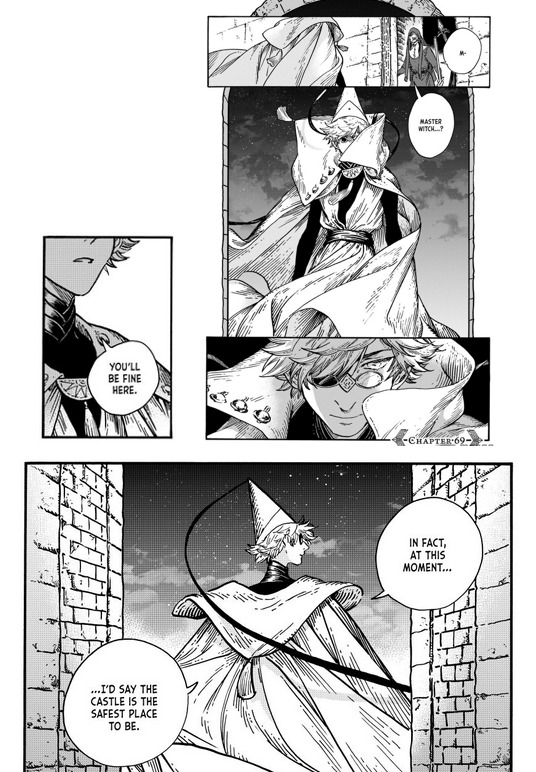
Let’s start by saying that in this chapter, Qifrey is back to his old habit of looking as suspicious as humanely possible. The first page is the only one where we briefly see his eye, with a look I want to describe as sorrowful, bitter and knowing. For the rest of the scene his face will stay partially hidden, and he never looks full on at the castle guard he is speaking to. His demeanor is distant, in contrast to the guard’s confusion and panic. In fact, it is a little funny how dodgy he is acting, given that he does nothing but noble deeds this entire chapter – bringing an escaped criminal back into custody, taking his apprentice to safety, safeguarding the medical tower against further attacks with a layer of salt.
So far, this looks like Qifrey’s classic brand of guilt-ridden self-sabotage, but the framing of the scene provides extra context. The threshold to Ezrest’s castle acts as a physical barrier separating Qifrey from the other man. During those three pages, they are both often shown framed by that doorway: the guard safe within the walls, contrasting Qifrey the outsider. The first page has a gust of wind pushing his robes around him, like an invisible force keeping him back. And we do know, because Qifrey emphasises this again for us, that this castle does indeed possess a natural repulsive force that keeps out monsters.
We are told in chapter 47 that, not only drawing magic within Ezrest castle won’t function, but that the castle’s walls repels all magical artefacts. It is because of that property that, when Coco notices that the leeches have not approached the castles’ walls, Qifrey immediately concludes that their current monstrous form is the result of a magical experiment.

Of course, “demons” are not the only beings who would be unable to enter the castle: any active spell should be repelled, meaning that Olruggio, for instance, can’t enter with his beautifying mask. Coco, with the bracelet stuck around her wrist, technically shouldn’t be able to enter at all, and the same goes for the characters with active magic drawn directy on their skin, like Coustas, Dagda and Eunie. In fact, even if he were perfectly human, it would be only natural for Qifrey to not step inside, since he couldn’t go in without taking off his glasses, which contain spells both to hide his scar and to protect him from harsh light.
And yet. I can’t help but see a very pointed parallel between Qifrey’s confidence that the castle will repel monsters, and the way the castle’s entrance seems to subtly repel him. In particular because it adds on to a long series of scenes featuring Qifrey’s anxieties around unnatural, magically created beings. This is at least the third time Qifrey brings up the creation of monsters in the days before the pact, which he calls “terrifying” and “a disgusting form of magic”. If the illustrations for those scenes are a glimpse into his mind, then it’s a mind full of nightmares. During their fight, the rogue Sage Engendil also lampshades how curiously familiar Qifrey seems to be with demons. Qifrey furthermore muses that he knows demons haven’t gone extinct, and in fact are still being created by witches to this day.

The demon in human skin
In short, my opinion is that chapters 68 and 69 together strongly hint at us that Qifrey is, or perceives himself as a demon. Now the question is: what new information would this reveal give us about him, his quest, and the way he has behaved so far?
First, we need to try and actually define what does and doesn’t count as a demon in that universe. Qifrey’s first halting description is “a monster, created with magic and by the hands of a witch”. A distinction is also made between magically altered animals that have adapted to their ecosystems and are useful or at least harmless to humans, and ferocious, uncontrollable beasts. So a demon is a new lifeform, artificially created through magic, that is inherently dangerous. The petty criminal from chapter 49 that got turned into a mindless and violent mass of giant leeches ticks all those boxes. Going by that logic, Coustas and Eunie wouldn’t fall into that category despite not being able to enter the Ezrest castle: modifying some of your body parts, or being turned into an existing animal wouldn’t count. Even Sasaran from the second test doesn’t seem to count as a demon: despite being hybridized with an animal, his consciousness hasn’t been affected and so he can’t be described as an “uncontrollable beast”, just a very heavily modified human.
One other interesting tidbit: “demon” is actually name dropped in chapter 59, a while before Qifrey’s fight with Engendil, when Beldaruit muses that a king who could use magic to gain power over life and death would become a “demon king”, someone capable of creating new lifeforms at will. This ties in the concept of demons to the other themes of the recent volumes, the dilemna of healing magic and resurection magic. What this could imply is that bringing someone back from certain death through magic carries the risk of altering them to the point where they would basically become a new lifeform, which has worrying implications for Dagda.
Going back to Qifrey though, there are three things we know for sure about him: 1) he has been experimented on with a type of magic never attempted before; 2) he looks and acts perfectly human, and 3) despite this, he is convinced that this new magic is dangerous, and must not only be destroyed but also kept secret at all costs. Finally, we know that those experiments left no visible trace on his body, because the Knights Moralis would have inspected him when they rescued him from the Brimhats (and would have soundly kicked him out of the Great Hall had they found anything). Barring other special characteristics we might not know about, what makes him unique as a demon is that he is undistinguishable from a normal human.
And that’s already more than enough to explain why he is freaking out so much.
What I like about this demon framework is that it can apply to several of the existing theories around Qifrey’s origin: whether he is a rescucitated corpse from Slistas, a silvertree turned human (I am still firmly standing behind that one), or a homonculus created from nothing by the Brimhats. In all three cases, whatever weird symptoms or powers he might have as a result of his creation, the very fact that he cannot be told apart from a human is what makes him truly dangerous. Because it shakes the very foundation of magical society.

We remember the central law of the Pointed Hats: the integrity of the human body is sacred, and therefore magic cast on the human body is taboo. A demon with a human appearance is a mockery of that principle, and a walking dilemna for the Pointed Hats. Demons used to be killed by heroes, and forbidden magical artefacts must be destroyed, but what do you do when that magical artefact is a living, breathing person?
(Speaking of, I have been wondering for a while what the Knights Moralis even do with people who have had spells tattooed on them, and especially those whose bodies have been altered. They can’t let them wander around, even with their memories gone, their very appearance would give the secret away. Do they keep them hidden in some prison or on an island, like the brainwashed witches? Asking for Eunie and Coustas, I’m worried about these kids)
From that perspective, Qifrey’s secrecy makes complete sense. The existence of demons with human faces not only raises all kinds of existential questions, but in the short term it risks making witch society even more repressive than it currently is. The Knights Moralis are already merciless to anyone seen with a tattooed spell or other evidence of having been involved with forbidden magic. Can you imagine how paranoid they would become if they literally couldn’t tell apart a demon from a human? Anyone could be a demon, pretty much.
In particular, this scenario explains why Qifrey is keeping the truth from those who might be tempted to help or protect him. After all, where would it leave Olruggio if he sided with a demon against his own society? Where would it leave Qifrey, if the only solution to erase that dangerous new magic were to destroy himself, but Olruggio wouldn’t let him? It also gives context to his line in chapter 40 “You want me to stay as Professor Qifrey? I would also like that, if it were possible”, and his description of his life at the atelier as something almost like a dream. Professor Qifrey doesn’t exist, and he has no right to live that peaceful life.

Anger and hope
A final bit of character musing I want to add to this: this theory of Qifrey as a demon, and the way he wrestles with that knowledge, also sheds some light on his more erratic actions and mood swings so far. What makes his motivations difficult to follow is that he always seems tugged between two extremes: destructive anger and fervent hope. Both are actually coping strategies that he tries to use to protect himself against paralysing guilt.
His anger at the Brimhats allows him to redirect his self-disgust towards those who made him. The true demons are those who willingly create monsters, he tells Engendil during their fight. These moments where he faces the Brimhats bring out a very different side of him, one that is confident, indignant and spiteful. Then, rather than being blinded by anger into chasing senseless revenge, he is calling on that anger to steel his resolve. He is using that indignation as a motivator to right a wrong done against both himself and witch society as a whole, even if he has to destroy himself in order to do so.
On the other hand, he seems to hold onto some hope that he might, somehow, erase the magic that created him but still miraculously keep himself alive. That is the side of him that fervently believes in the miracles of magic and in the power of creativity, inspired in him by Beldaruit, and passed along to Coco. His stance seems to be that he needs to dive into the ugly core of those experiments, and that maybe, just maybe, a way to save himself will occur to him just in the nick of time. It’s an interesting coincidence, by the way, that he is staring down the maws of water-dwelling demons while having those thoughts.
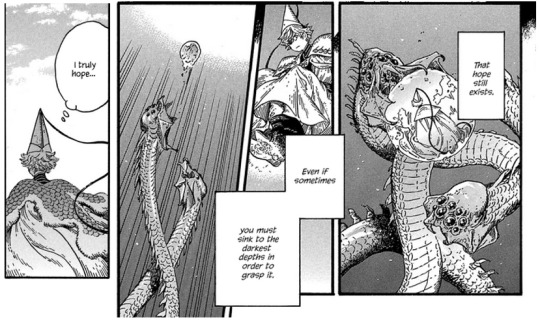
And on that note, hold on to indignation and hope when the going gets tough (but don’t brainwash your friends), and thank you for reading!
#witch hat atelier#witch hat meta#witch hat spoilers#qifrey#treefrey#sort of: this is a more general theory#I do apologise about the quality of those images#might try to fix that later#go go little demon tree go
104 notes
·
View notes
Note
This is probably rude question, feel free to skip it since I'm not the kind to demand personal essays from strangers.
But, why paganism/occult/witchcraft/wicca/spiritual at all? Sure placebos exist and it's cool to honor the earth but...look at that list you made yourself of awful things that come from assuming inner experience has some kind of weight or bearing on the physical world. I guess traditional tribal stuff would be okay if you're in that group, it's more cultural, but I don't know about deliberately trying to create traditions. I feel like that's how you get cults
Source: has seen all the cool people I knew into the above go right wing conspiracist. Also, covid related batshittery.
Hey anon, I don't think your question is rude. In fact, I've grappled with this kind of thing myself when in a bad headspace. Sometimes it's easy to look at all the bad stuff that's been motivated or justified with various forms of spirituality and think that it might be better if we just got rid of it all.
But the thing is, "religion" and "spirituality" encompass many different things, and in some cases it's very beneficial to people's mental health. If we just took it all away, we might be doing significant harm to people. Also, what are we going to fill the resulting void with? Many people have a strong drive to explore and experience spirituality. That's not just going to go away.
And another thing is, eliminating spirituality and religion won't eliminate cults; people will just make cults around different things. The social environment around cryptocurrency is notoriously cultlike; people trust the rich techbros to know what they're talking about when they basically claim that crypto will save the world, even though all evidence suggests otherwise.
It also won't eliminate batshittery. Literally any form of batshittery that can be justified within a spiritual worldview can and will be justified within a "scientific" one. The HAARP conspiracy theory, for example, is a modern "scientific" take on the old conspiracy theory that witches were causing storms with evil demonic magics.
COVID/antivax batshittery is likewise fully capable of thriving in a "scientific" context. You don't have to believe in supernatural forces to believe that there's an evil conspiracy trying to poison us or sabotage our DNA.
Spirituality also doesn't require one to assume their inner experiences have weight or bearing on the external world. Like, it's a big thing in New Age spirituality right now, but New Age is actually kind of the outlier here. While it does creep into neopaganism and other forms of religion to a degree, it's just not the norm.
Basically, this is an extremely complicated problem, and "just don't do religion/spirituality" is one of those oversimplified solutions that just won't solve it. If anything, it's coming from a pretty polarized of the world, which never goes anywhere good. Polarized thinking is a major driving factor in pretty much every noxious movement, so if we catch ourselves thinking in polarized ways, it's a good idea to slow down and ask ourselves if there's maybe something we're missing.
50 notes
·
View notes
Note
Your kink posting has got me questioning 🤔 do you have head canon kinks for all the companions? ( or at least the hot girlies )
To a point yes, but they are still being formed. I do think there are certain characters that are just Less Kinky, not because their personality means they CAN'T be kinky but, idk... for balance, and because it seems less Likely. My thoughts on the companions so far:
Shadowheart: Very kinky, true sadist / masochist (both equally). I think she'd enjoy a LOT of things, but the classics: bondage, impact, knives, wax play, degradation, worship, roleplay (especially religious, training and corruption themes), edging/denial, CNC... I also think that she would really enjoy rigging, if she ever got the time and setting to practice that. Perhaps she would adapt it from Sharran torture methods similar to Japanese rope techniques used in the Edo period to extract confessions. I think that she would enjoy the slow ritual of it, I think she would enjoy its elegance, and I think she'd enjoy how excruciating but euphoric it can be. Again, she'd be into many things, and very adept at turning most kinks into something she can engage with via the right dynamic and context.
Lae'zel: Also very kinky in a completely different way; much more about the power dynamics than the methods. Biggest thing would probably be Primal. Possessive. Defs messy; BO, sweat, blood, tears, spit, piss probably lmao. Would love contests of strength, causing controlled damage to bodies and enduring pain. I think with more trust and affection established with someone, she would be able to enjoy another layer of play; immobilization, sensory-focused play, degradation/humiliation, fear play, care giving/receiving, overstimulation... still very much into possessiveness in play, but with an emotional element that made it even more intense.
Karlach: I think Karlach would do plenty of kink without being deeply invested in it; she wants a good time and is up to try anything once. An element of Karlach's character that I think is very relevant to her relationship to kink and sex in general is that Karlach basically Never feels physically vulnerable; she knows that she's usually the biggest, toughest badass in the room. I think that would make her very sexually adventurous because she simply wouldn't fear much. What she struggles with is intimacy, and her building emotional trust would be the most significant element of her relationship to kink. All that said; I imagine her favourite kinky fun would be rough fucking, manhandling, wrestling, skin-contact sensory-focused play, temperature play, leather (because its badass and feels good), and honestly?? Oonga Boonga caveman brain misogyny-tinged degradation. Just feels right for her. The simple pleasure of a little lover under her saying how big she is and how hard she goes and begging to be knocked up would absolutely send her. I just FEEL it
Gale: I don't have many well formed thoughts on Gale's kinks. I suspect he'd be into like... Tantric Embodied Karma Sutra stuff, with a lot of wizardy bells and whistles. Creating an experience of non-duality as a kink. Basically, that guy at the Crystal Rainforest Festival that is suspected of being a cult leader and has VERY good drugs for sale. The kind of kink he does, Gale probably does
Astarion: Hmmmmm. I can see him, over time, coming to a place of comfort with non-sexual kink as a way to engage with power difference (Astarion forming a healthy identity as a dominant would be really good for him I think) and experience grounding, safe sensations within his body. I think kinky sex would take longer, but submission would be extremely difficult and vulnerable for him; forming a responsible dominant identity could be quite healing for him. On the other hand, choosing to submit to a dominant that he actually trusted and who took care of him could also be very very healing, just... I think that would be difficult for him to do safely. It would take a great deal of time to get there.
Wyll: Probably a less kinky person, but man, I think he'd be a great pampered sub. Worshipping, being treated like a bit of a boy toy. Would love mutual possessiveness. That'd be hot frankly. But I'm still figuring his kink vibe out! I gotta play his romance.
Minthara: Freak. Proper freak. Terrifying freak. Snuff kink freak.
Halsin: Wholesome freak into surprisingly intense shit. Exhibitionism, primal, breeding, rough, biting. Wants a lot of stimulation in every way.
62 notes
·
View notes